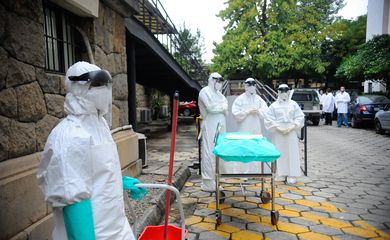Ebola: preparing hospitals is the greatest challenge


The Institute, at the request of authorities from a number of municipalities, has been putting together a training program for all health care professionals. (Tânia Rego/Agência Brasil)

Luiz Carlos Pereira, technical director of the Emílio Ribas Institute for Infection Diseases and Hospital, said on Wednesday (Nov 13) that Brazil's greatest challenge regarding the ebola epidemic is to get all of the country's health care system ready to detect possible cases of the illness.
During a public hearing at the Social Security and Family Commission of the Chamber of Deputies, the director described the work of the Emergency Care Unit (UPA) in the southern city of Cascavel, Paraná, as an example of competence and efficiency in identifying the first and only suspected case of ebola in the country. A lot more worrying, he claims, is the possibility of overlooking an ebola case.
Pereira says that the Institute, at the request of authorities from a number of municipalities, has been putting together a training program for all health care professionals. “Information must be communicated to all basic healthcare centers,” he argued.
Cláudio Mairerovitch, director of Infectious Diseases Department at the Health Ministry, said that the chances of a person bringing the virus to Brazil are remote but real. “Our priority is to prevent a case from arriving, but if it does, [we must] prevent it from being transmitted to another person,” he said. He went on to point out that countries like the US and Spain have already reported secondary cases following the arrival of patients infected with the disease.
During the debate, Henrique Vazquez, a representative from the Pan American Health Organization (Paho) in Brazil, highlighted the importance of preventing local transmission in case the illness reaches the country. In his view, the key measures to be taken are the early detection of the sickness, isolating and monitoring the patient, and not losing track of physical contact.
Translated by Fabrício Ferreira
Fonte: Ebola: preparing hospitals is the greatest challenge


